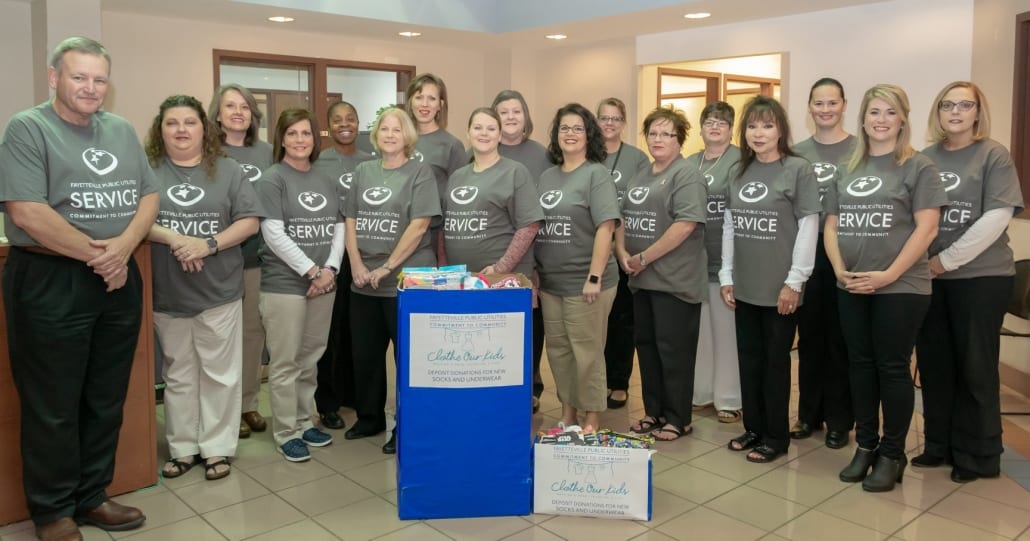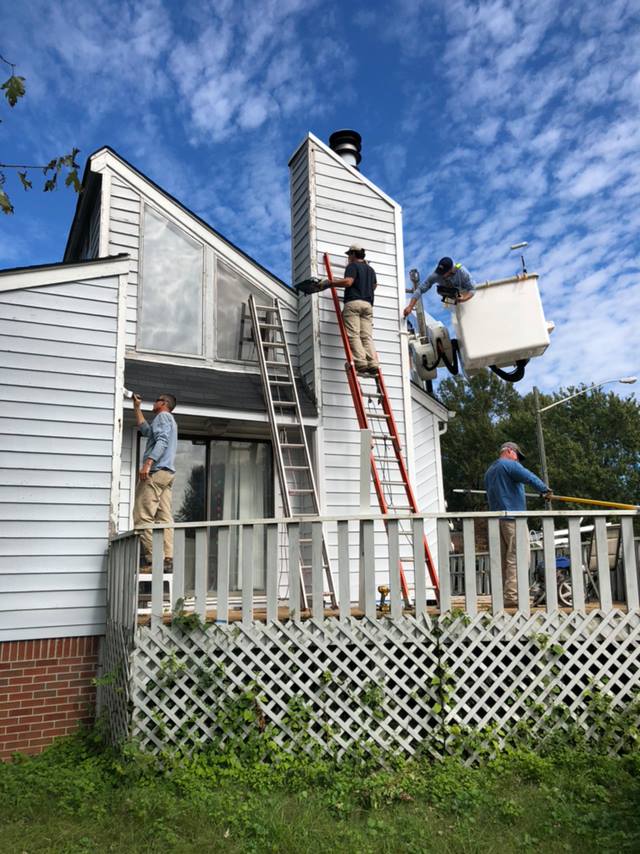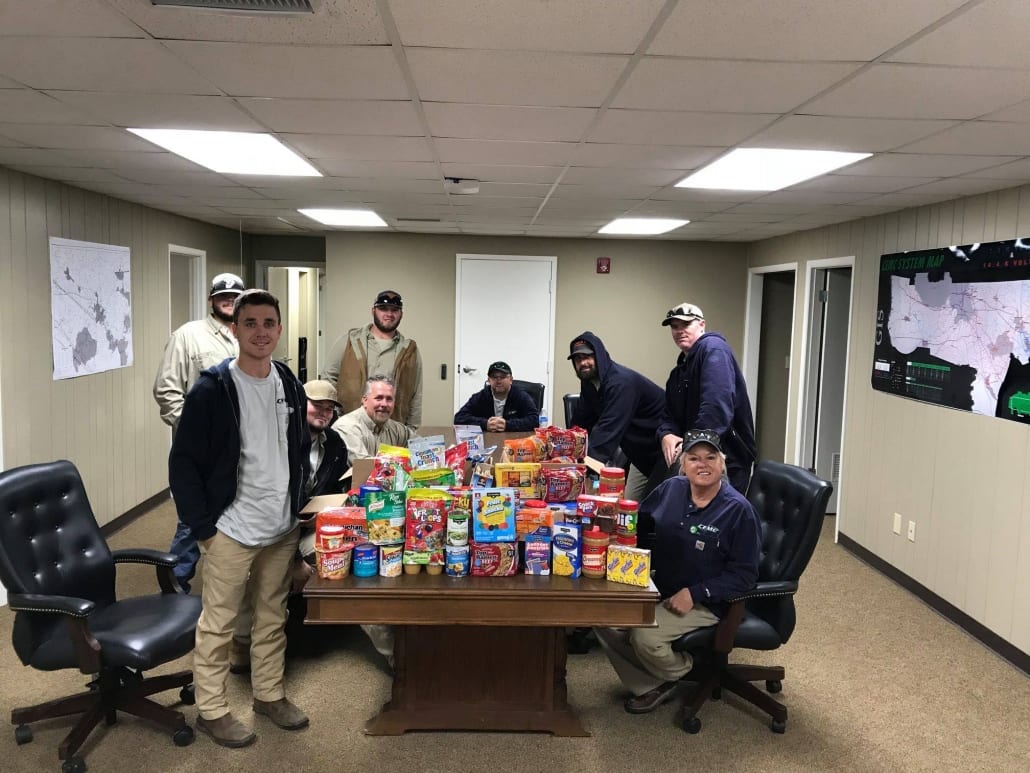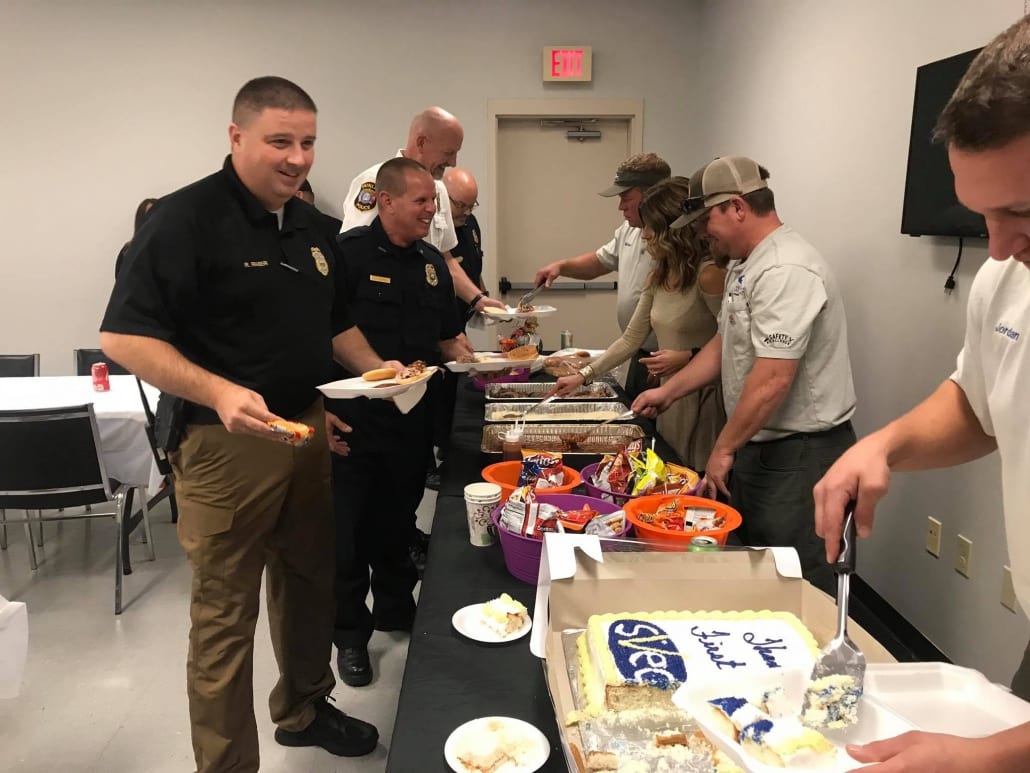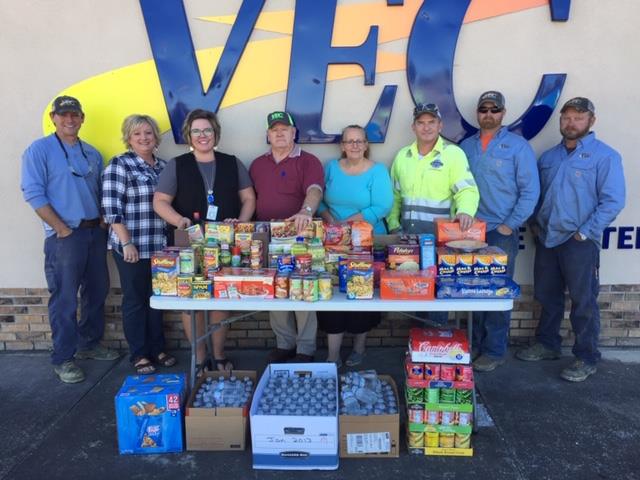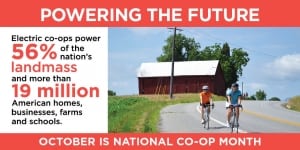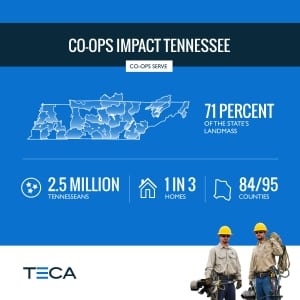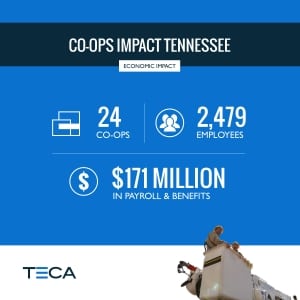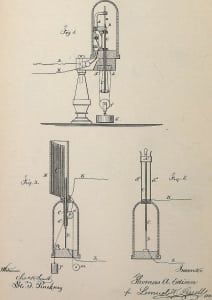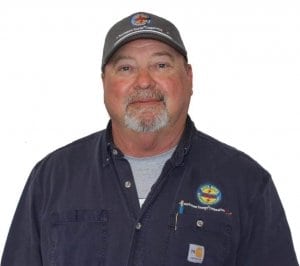Tennessee’s electric co-ops work very hard to build strong and resilient power distribution systems, but winter storms can cause widespread damage for even the most prepared utilities. These tips from ready.gov can help your family be safe and better prepared for winter storms.
Extended power outages may impact the whole community and the economy. A power outage is when the electrical power goes out unexpectedly. A power outage may:
- Disrupt communications, water, and transportation.
- Close retail businesses, grocery stores, gas stations, ATMs, banks, and other services.
- Cause food spoilage and water contamination.
- Prevent use of medical devices.
Protect yourself during power outages
- Keep freezers and refrigerators closed.
- Only use generators outdoors and away from windows.
- Do not use a gas stove to heat your home.
- Disconnect appliances and electronics to avoid damage from electrical surges.
- Have alternate plans for refrigerating medicines or using power-dependent medical devices.
- If safe, go to an alternate location for heat or cooling.
- Check on neighbors.
How to stay safe when power outages are predicted
Prepare NOW
- Take an inventory of the items you need that rely on electricity.
- Talk to your medical provider about a power outage plan for medical devices powered by electricity and refrigerated medicines. Find out how long medication can be stored at higher temperatures and get specific guidance for any medications that are critical for life.
- Plan for batteries and other alternatives to meet your needs when the power goes out.
- Sign up for local alerts and warning systems. Monitor weather reports.
- Install carbon monoxide detectors with battery backup in central locations on every level of your home.
- Determine whether your home phone will work in a power outage and how long battery backup will last.
- Review the supplies that are available in case of a power outage. Have flashlights with extra batteries for every household member. Have enough nonperishable food and water.
- Use a thermometer in the refrigerator and freezer so that you can know the temperature when the power is restored. Throw out food if the temperature is 40 degrees or higher.
- Keep mobile phones and other electric equipment charged and gas tanks full.
Survive DURING
- Keep freezers and refrigerators closed. The refrigerator will keep food cold for about four hours. A full freezer will keep the temperature for about 48 hours. Use coolers with ice if necessary. Monitor temperatures with a thermometer.
- Maintain food supplies that do not require refrigeration.
- Avoid carbon monoxide poisoning. Generators, camp stoves, or charcoal grills should always be used outdoors and at least 20 feet away from windows. Never use a gas stovetop or oven to heat your home.
- Check on your neighbors. Older adults and young children are especially vulnerable to extreme temperatures.
- Go to a community location with power if heat or cold is extreme.
- Turn off or disconnect appliances, equipment, or electronics. Power may return with momentary “surges” or “spikes” that can cause damage.
Be Safe AFTER
- When in doubt, throw it out! Throw away any food that has been exposed to temperatures 40 degrees or higher for two hours or more, or that has an unusual odor, color, or texture.
- If the power is out for more than a day, discard any medication that should be refrigerated, unless the drug’s label says otherwise. If a life depends on the refrigerated drugs, consult a doctor or pharmacist and use medicine only until a new supply is available.
NASHVILLE – The Tennessee Electric Cooperative Association, a trade association representing the state’s 23 electric cooperatives, announced recently that Shelby Vannoy is joining the association as political affairs coordinator.
Vannoy will assist with the association’s legislative and grassroots efforts. “I am honored to join the staff at TECA,” says Vannoy. “Their advocacy efforts give a voice to 2.5 million co-op consumers across the state. I look forward to working with co-ops to ensure that rural and suburban issues are heard on the state and federal level.”
Vannoy is a recent graduate of the University of Tennessee Martin with a degree in agricultural business.
“The decisions made in Nashville and Washington, D.C., can have a significant impact on the consumers we serve,” says Mike Knotts, vice president of government affairs for TECA. “It is important for co-ops to be engaged with lawmakers, and we are excited that Shelby is joining our team.”
State’s electric cooperatives gather in Nashville to explore the opportunities facing co-ops
NASHVILLE – “Power and Opportunity” was the theme of the 77th annual meeting of the Tennessee Electric Cooperative Association, held Sunday, Nov. 18, through Tuesday, Nov. 20, in Nashville. More than 350 electric cooperative leaders from across the state attended the event where they explored the impact of co-ops and challenged one another to meet the needs of their communities.
“Each day, electric co-ops enable the communities we serve to prosper,” says David Callis, executive vice president and general manager of the Tennessee Electric Cooperative Association. “Rural and suburban Tennessee is well positioned to grow, and our role in that success has been and continues to be significant. The powerlines we build carry more than power. They deliver power and opportunity.”
Elections were held for three positions on the association’s board of trustees. John Roberts, a director for Pickwick Electric Cooperative in Selmer; Jimmy Gregory, manager for Upper Cumberland Electric Membership Corporation in Carthage; and Dave Cross, manager for Plateau Electric Cooperative in Oneida, were elected to four-year terms.
“We congratulate those selected to serve on the TECA board of trustees,” says Callis. “Their talents and ideas will be valuable as we work to serve Tennessee’s electric cooperatives and their consumers.”
The fourth annual TECA Top Tenn Communications Awards were presented during the event. Meriwether Lewis Electric Cooperative received an award for Best External Newsletter or Magazine Section; Middle Tennessee Electric Membership Corporation, Best Internal Newsletter; Duck River Electric Membership Corporation, Best Website; Sequachee Valley Electric Cooperative, Best Use of Social Media. Duck River Electric Membership Corporation, Middle Tennessee Electric Membership Corporation and Gibson Electric Membership Corporation each received Awards of Excellence in the Wild Card category, with Middle Tennessee Electric Membership Corporation, Sequachee Valley Electric Cooperative and Meriwether Lewis Electric Cooperative earning Awards of Merit.
“It is important for electric cooperative consumer-owners to be educated and informed,” says Robin Conover, TECA’s vice president of communications and editor of The Tennessee Magazine. “We honor these winners for telling the electric cooperative story in a professional way.”
NASHVILLE – More than 400 electric co-op employees participated in the 2018 Tennessee Electric Cooperative Day of Service on Thursday, Oct. 18. Twenty-five individual service projects were completed across the state with 13 co-ops allowing 425 employees to volunteer more than 1,000 hours in service to their local communities.
“It’s amazing what giving hearts and willing hands can do!” says Vanessa Clayborn, manager of member services at Meriwether Lewis Electric Cooperative in Centerville, Tenn. “We had 53 employees participate in this year’s Day of Service, and the results are staggering and life-changing for those who participated and those we helped.”
“It is really incredible to see the passion that co-op employees have for their communities,” says Trent Scott, vice president of corporate strategy and organizer of the event. “We frequently talk about service to community, and this event puts words into action in very real and tangible ways.”
Service projects completed for this year’s event include four energy efficiency workshops or safety demonstrations, five parks and playgrounds cleaned and refurbished, seven food and clothing drives, four luncheons for local veterans or first responders and two home building projects.
This is the second Day of Service event conducted by Tennessee co-ops. In its two-year history, 756 employees have volunteered more than 2,000 hours in service to their communities.
Photos from the 2018 Day of Service event:
NASHVILLE – More than 180 volunteer lineworkers from 20 electric co-ops across Tennessee are heading to Georgia, Florida and North Carolina to assist with Hurricane Michael recovery efforts. This is the largest storm assistance effort made by Tennessee co-ops in recent years.
The dangerous Category 4 hurricane brought strong wind, significant rainfall and widespread power outages to the northern Gulf Coast. Tennessee co-op are assisting with efforts to reconstruct the severely damaged electric infrastructure in the region.
The Tennessee Electric Cooperative Association in Nashville coordinates requests for mutual aid and makes travel and lodging arrangements for crews who respond.
“Working on high-voltage lines on a sunny day is dangerous, but in disaster conditions the danger is exponentially greater,” says David Callis, executive vice president and general manager of the Tennessee Electric Cooperative Association. “Please keep these brave volunteers in your prayers.”
Below is the most up to date list of crews and their locations:
- Appalachian Electric Cooperative – 11 lineworkers to Talquin Electric Cooperative in Quincy, Florida
- Caney Fork Electric Cooperative – Nine lineworkers to United Energy in Statesboro, North Carolina
- Chickasaw Electric Cooperative – Five lineworkers to Grady Diverse Power Cooperative in LaGrange, Georgia
- Cumberland Electric Membership Corporation – nine lineworkers to Grady Electric Membership Corporation in Cairo, Georgia
- Duck River Electric Membership Corporation – 14 lineworkers to Colquitt Electric Membership Corporation in Moultrie, Georgia
- Fayetteville Public Utilities – eight lineworkers to Diverse Power Cooperative in LaGrange, Georgia
- Fort Loudoun Electric Cooperative – eight lineworkers to Mitchell Electric Membership Corporation in Camilla, Georgia
- Gibson Electric Membership Corporation – eight lineworkers to Carroll Electric Membership Corporation in Carrolton, Georgia
- Holston Electric Cooperative – nine lineworkers to Talquin Electric Cooperative in Quincy, Florida
- Middle Tennessee Electric Membership Corporation – eight lineworkers to Excelsior Electric Membership Corporation in Statesboro, Georgia
- Mountain Electric Cooperative – 12 lineworkers to Mitchell Electric Membership Corporation in Camilla, Georgia
- Plateau Electric Cooperative – four lineworkers to Gulf Coast Electric Cooperative in Wewahitchka, Florida
- Powell Valley Electric Cooperative – 12 lineworkers to Suwannee Valley Electric Cooperative in Live Oak, Florida
- Sequachee Valley Electric Cooperative – 10 lineworkers to Mitchell Electric Membership Corporation in Camilla, Georgia
- Southwest Tennessee Electric Membership Corporation – 10 lineworkers to Grady Electric Membership Corporation in Cairo, Georgia
- Tennessee Valley Electric Cooperative – 10 lineworkers to Mitchell Electric Membership Corporation in Camilla, Georgia
- Tri-County Electric Cooperative – eight lineworkers to Diverse Power Cooperative in LaGrange, Georgia
- Tri-State Electric Cooperative – five lineworkers to Mitchell Electric Membership Corporation in Camilla, Georgia
- Upper Cumberland Electric Membership Corporation – 11 lineworkers to Flint Energies in Warner Robbins, Georgia
- Volunteer Energy Cooperative – 10 lineworkers to Sumpter EMC in Americus, GA
Evolving technology is changing how energy is generated and distributed through the electric grid to homes and businesses. These changes have brought new challenges and opportunities to electric co-ops working to keep pace with the evolving landscape.
Within the electric cooperative workforce, new skills and experience are needed to help co-ops meet shifting market and consumer demands. This is why electric co-ops are recruiting fresh talent to help us provide even greater value to our members.
Co-ops are owned by the people we serve. This subtle fact impacts everything that happens at the cooperative.
People – the consumers we serve – always come before profits, and our employees are serious about the responsibility that we have to provide power to our communities. The work that we do not only makes life more comfortable and convenient, but we also make the hospitals operate, the factories run and the cell phones, computers and other technology that we rely on each day function.
Our employees power everyday life for our region. It is a serious – and sometimes hazardous – job that is incredibly rewarding and full of opportunity.
There is a broad range of highly-trained professionals working behind the scenes at your local co-op.
Lineworkers are the most visible and identifiable employees of the co-op, but their responsibilities go far beyond climbing poles and repairing lines. They can also pinpoint an outage from miles away and restore power remotely.
Experts in information technology are increasingly important to safeguard the grid and protect data and other sensitive cyber assets. Engineers provide ongoing expertise and guidance on the operations side of the utility, particularly as system upgrades and more renewable energy choices become available.
Professionals in business administration, communication and digital media help co-ops deliver messages through multiple platforms and keep members informed of critical information in today’s 24/7 media environment.
Electric co-ops are looking for people with technical skills who also understand our mission to serve our communities and members.
Simply put, we believe co-ops build a better world, and we are looking for talented people to join us. Contact your local co-op to learn more about a career that is close to home, but far from ordinary.
NASHVILLE – The Tennessee Electric Cooperative Association submitted feedback regarding the Rural Utilities Service’s e-Connectivity Pilot Program during a comment period provided by the RUS.
The e-Connectivity Pilot Program was was made possible by a $600 million appropriation from Congress in the Consolidated Budget Act of 2018. The USDA is working to create new funding and finance offerings through this pilot program to expand rural broadband in underserved rural and tribal areas.
Comments made by TECA to the RUS highlighted the successes of Tennessee’s electric co-ops in broadband and the need for additional funding to speed deployment. TECA affirmed comments made by the National Rural Electric Cooperative Association and requested consideration of seven additional suggestions:
- Projects that achieve universal service inside a provider’s service territory should be incentivized over similar projects that leave significant gaps in coverage between communities
- Projects that leverage additional investment in broadband infrastructure beyond the receipt of a grant itself should be incentivized over a similar project(s) that rely solely upon the program itself for its existence
- Allow applicant(s) an opportunity to rebut any challenges of eligibility by third parties
- Allow flexibility to award funds to any party participating in a partnership or other project that involves multiple eligible parties
- Allow grants to be payable in multiple awards, rather than a single payment, if so desired by the recipient
- Allow a small percentage of grants to be usable for start-up expenses of subsidiary entities
- Provide loan products inside the pilot program at an interest rate below what is otherwise available by existing RUS programs, including FFB loans, or other more advantageous terms.
“We believe that the RUS’s e-Connectivity Pilot Program has the potential to have a meaningful impact on the expansion of broadband in rural Tennessee,” says Mike Knotts, vice president of government affairs with the Tennessee Electric Cooperative Association. “We appreciate Secretary Purdue and the team at RUS for considering the input of Tennessee’s electric cooperatives.”
You can read TECA’s full comments below.
[pdf-embedder url=”https://www.tnelectric.org/wp-content/uploads/2018/09/TECA-RUS-e-Connectivity-Comments.pdf” title=”TECA RUS e-Connectivity Comments”]
NASHVILLE – More than 140 lineworkers from 15 Tennessee electric cooperatives will soon be heading to North Carolina to assist with Hurricane Florence recovery efforts. The massive hurricane is expected to leave widespread damage across much of the Atlantic seaboard.
Tennessee electric co-op crews are planning to leave from multiple locations beginning on Wednesday morning. Most will ride out the storm in western or central North Carolina before heading further east once the storm passes through. It is unclear how long they will be in North Carolina.
“Our crews have a reputation for responding quickly, working safely and showing compassion to those who have been impacted by storms like this one,” says David Callis, executive vice president and general manager of the Tennessee Electric Cooperative Associaiton. “We commend their desire to serve and wish them well in the days to come.”
Please keep the people of the Atlantic coast, as well as our volunteer lineworkers and their families, in your thoughts and prayers in the days ahead.
Below is a list of Tennessee co-ops providing assistance and the name and location of the co-op they will be helping. This information is likely to change as the storm nears the coast.
- Appalachian Electric Cooperative in New Market, Tenn. – 12 lineworkers to Piedmont EMC in Hillsboro, North Carolina
- Caney Fork Electric Cooperative in McMinnville, Tenn. – eight lineworkers to Pee Dee EC in Wadesboro, North Carolina
- Chickasaw Electric Cooperative in Somerville, Tenn. – five lineworkers to Randolph EMC in Asheboro, North Carolina
- Cumberland Electric Membership Corporation in Clarksville, Tenn. – 10 lineworkers to South River EMC in Fayetteville, North Carolina
- Duck River Electric Membership Corporation in Shelbyville, Tenn. – nine lineworkers to Lumbee River EMC in Red Springs, North Carolina
- Fayetteville Public Utilities in Fayetteville, Tenn. – eight lineworkers to Tri-County EMC in Dudley, North Carolina
- Holston Electric Cooperative in Rogersville, Tenn. – eight lineworkers to Lumbee River EMC in Red Springs, North Carolina
- Meriwether Lewis Electric Membership Corporation in Centerville, Tenn. – five lineworkers to Cape Hatteras Electric Cooperative in Buxton, North Carolina
- Middle Tennessee Electric Membership Corporation in Murfreesboro, Tenn. – 15 lineworkers to Carteret-Craven EC in Newport North Carolina
- Plateau Electric Cooperative in Onieda, Tenn. – 13 lineworkers to South River EMC in Fayetteville, North Carolina
- Sequachee Valley Electric Cooperative in South Pittsburg, Tenn. – 10 lineworkers to Four County EMC in Burgaw, North Carolina
- Southwest Tennessee Electric Membership Corporation in Brownsville, Tenn. – 10 lineworkers to Jones-Onslow EMC in Jacksonville, North Carolina
- Tri-County Electric Membership Corporation in Lafayette, Tenn. – eight to Energy United in Statesville, North Carolina
- Tennessee Valley Electric Cooperative in Savannah, Tenn. – 10 lineworkers to Central EMC in Sanford, North Carolina
- Upper Cumberland Electric Membership Corporation in Carthage, Tenn. – 12 lineworkers to Four County EMC in Burgaw, North Carolina
NASHVILLE – Three Tennessee electric co-ops will receive almost $3 million to help expand broadband availability. Gibson Electric Membership Corporation, Holston Electric Cooperative and Meriwether Lewis Electric Cooperative each submitted winning bids in the most recent Federal Communications Commission Connect America Fund II (CAF II) reverse auction.
Over the next ten years, Gibson Connect, a subsidiary of Gibson EMC, will receive $1.22 million, Holston Connect, a subsidiary of Holston EC, will receive $530,000 and ML Connect, a subsidiary of Meriwether Lewis EC, will receive $1.18 million.
These three Tennessee co-ops were among 35 nationally that will receive $225 million to help defray the costs of deploying broadband in underserved areas. The CAF II auction marks the first time that the FCC allowed electric cooperatives to bid for funding as broadband service providers.
“We are pleased to see the FCC recognize that electric co-ops have a unique opportunity to bring broadband to rural and suburban America,” says David Callis, executive vice president and general manager of the Tennessee Electric Cooperative Association. “Tennessee’s electric co-ops have demonstrated our ability to successfully deliver broadband, and we will continue to seek out innovative funding sources and partnerships to make this happen.”
NASHVILLE – It is an exciting and exhausting time, the culmination of a season of hard work. However, the rush to harvest can also yield tragic outcomes. Each year, dozens of farm workers are killed and hundreds are injured in accidents involving power lines and electrical equipment.
“Things get very busy this time of year on the farm, and it is all too easy to forget the danger that may be just overhead,” says Trent Scott, spokesperson for the Tennessee Electric Cooperative Association.
Review with all workers the farm activities that take place around power lines. Inspect the height of farm equipment to determine clearance. Keep equipment at least 10 feet away from power lines – above, below and to the side – a 360-degree rule.
“Take the time to lower grain augers before moving them, even if it’s only a few feet,” says Scott. “Also use extreme caution when raising booms or buckets on equipment.”
Tennessee’s electric cooperatives encourage farm workers to take these steps to ensure a safer harvest season:
- Use care when raising augers or the bed of grain trucks around power lines.
- Use a spotter when operating large machinery near power lines. Do not let the spotter touch the machinery while it is being moved anywhere near power lines.
- As with any outdoor work, be careful not to raise any equipment such as ladders, poles or rods into power lines. Remember, non-metallic materials such as lumber, tree limbs, ropes and hay will conduct electricity depending on dampness, dust and dirt contamination.
- Never attempt to raise or move a power line to clear a path!
- Don’t use metal poles to break up bridged grain inside bins. Know where and how to shut off the power in an emergency.
- Use qualified electricians for work on drying equipment and other farm electrical systems.
Operators of farm equipment or vehicles must also know what to do if the vehicle comes in contact with a power line: Stay on the equipment, warn others to stay away and call 911. Do not get off the equipment until the utility crew says it is safe to do so.
“If the power line is energized and you step outside, high-voltage could flow through your body,” Scott said. “Stay inside the vehicle unless there’s fire or imminent risk of fire.”
If this is the case, jump off the equipment with your feet together, without touching the ground and vehicle at the same time. Then, still keeping your feet together, hop to safety as you leave the area.
Once you get away from the equipment, never attempt to get back on or even touch the equipment. Some electrocutions have occurred after the operator dismounts and, realizing nothing has happened, tries to get back on the equipment.
It is very important that all farm workers and seasonal employees are informed of electrical hazards and trained in proper procedures to avoid injury.
For other tips on how to be safe around electricity visit www.everydaysafe.org or call the safety experts at your local electric cooperative.
NASHVILLE – Sequachee Valley Electric Cooperative lineman Nick Gipson flipped a ceremonial switch to light the midway at the 2018 Tennessee State Fair on Friday, Sept. 7, in Nashville.
Attendees of the opening ceremony heard from legislators and elected officials, including Nashville Mayor David Briley and David Callis, executive vice president and general manager of the Tennessee Electric Cooperative Association.
“The theme for this year’s fair is ‘The Heart of Tennessee,’ and over the next 10 days this will be a celebration of our state’s unique culture, art, music and food,” said Callis. “You can also find the heart of Tennessee in the 2,600 electric co-op employees across the state. Their work keeps the lights on, our cell phones charged and the computers running. Their time, effort and sacrifices make civilized life possible for the rest of us.”
“For more than 150 years, the fair has been a celebration of rural Tennessee life,” says David Callis, executive vice president and general manager of the Tennessee Electric Cooperative Association. “It is where World War I hero Sgt. Alvin York showed his prize Hereford and generations have marked the beginning of autumn. It is an honor for Tennessee’s electric co-ops to be a part of this great event.”
The following resources are available for use in October.
- Leadership column – Co-op Month
- Magazine article – Co-ops Vote
- Energy Vampires media release/article – Customize for magazine, post to website and distribute to local media
Other Resources
Social Media
Posts for October
- October 1 – Happy #CoopMonth! Electric cooperatives are more than energy providers. Discover what it means to be part of an electric co-op: [Link to co-op’s website or applicable webpage]
- October 2 – As a co-op, we are owned by the community we serve. That’s why our member-owners come first, now and always. #coopseethefuture #CoopMonth #coopsbuildup
- October 3 – Do you know where your energy comes from? You may be one of hundreds of electric co-ops like us, who proudly serve 1 in 8 Americans across 48 states. #coopseethefuture #CoopMonth #coopsbuildup
- October 4 – Some things fade with time, but our commitment to our members only grows stronger. #coopseethefuture #CoopMonth #coopsbuildup
- October 5 – Tennessee law requires motorists to slow down or move over when passing utility crews on the side of the road. Help our lineworkers to get home safely and #moveoverTN [LINK TO MOVEOVERTENNESSEE.ORG]
- October 8 – The state of Tennessee’s Remastered series focuses on Tennessee’s most iconic companies. This episode takes a look at a co-op served business – Jack Daniels in Lynchburg. #coopsbuildup [LINK TO https://youtu.be/8eq8WOXRyvQ]
- October 9 – Share a behind-the-scenes image from the co-op (linemen loading up for the day, dispatch center, etc…) Explain how this work serves the members.
- October 10 – Share article from tnmagazine.org. [LINK TO ARTICLE ON TNMAGAZINE.ORG]
- October 11 – Co-ops build stronger communities. #coopsbuildup Tennessee. #CoopMonth [Share Build Up video: https://www.youtube.com/watch?v=D-0EePVhRcw]
- October 12 – Voting is important. Election day is November 6. #coopsvote
- October 15 – Share article from tnmagazine.org. [LINK TO ARTICLE ON TNMAGAZINE.ORG]
- October 16 – Electric co-ops have a significant impact on Tennessee. #coopsbuildup #coopmonth
- October 17 – Tennessee’s electric co-ops keep the lights on 99.96 percent of the time. #coopsbuildup #coopmonth
- October 18 – Today is the Tennessee Electric Co-op Day of Service. Our employees are serving our communities by [PROVIDE DETAILS ON YOUR PROJECTS AND INCLUDE PHOTOS] #TNcoopdayofservice
- October 19 – Tennessee’s co-ops are proud to be a part of the communities we serve. #coopsbuildup #coopmonth
- October 21 – On this day in 1879 Thomas Edison devised a workable electric light bulb in his laboratory in Menlo Park, New Jersey.
- October 22 – Cooler temps are just around the corner! Is your home’s heating system ready?
- October 23 – Two weeks from today Americans will head to the polls. We hope to see you there. #coopsvote [LINK TO VOTING ARTICLE ON WEBSITE]
- October 24 – Share article from tnmagazine.org. [LINK TO ARTICLE ON TNMAGAZINE.ORG]
- October 25 – Share a behind-the-scenes image from the co-op (linemen loading up for the day, dispatch center, etc…) Explain how this work serves the members.
- October 26 – Washington Youth Tour changes lives, and we are proud to be a part of it. Learn more at youthtour.tnelectric.org. #TNWYT
- October 29 – Make your voice heard this #electionday. #coopsvote
- October 30 – Follow these helpful tips to slay the energy vampires in your home. [LINK TO ENERGY VAMPIRE ARTICLE ON YOUR WEBSITE]
- October 31 – Our team at [CO-OP NAME] wish you and your family a safe and happy Halloween.
Today two Tennessee co-ops announced projects to expand broadband.
Just over 79 years ago, from the Centerville Courthouse steps in Hickman County, Meriwether Lewis Electric Cooperative’s first leaders announced its commitment to provide safe, affordable, reliable electricity to areas overlooked by other providers. Today from the same location, MLEC President and CEO Keith Carnahan announced that MLEC was furthering that original initiative and launching Meriwether Lewis Connect, LLC, to deliver broadband internet across the five counties it serves.
“Our areas need broadband for education, healthcare, and community development. Studies show it is a vital need to attract and retain families and businesses,” said Carnahan. “Bringing high-speed internet to all our members is one of the largest investments we’ve made since our inception 79 years ago. It is a huge step in a completely different arena, but helping rural communities build essential services is just another facet of what cooperatives are designed to do.”
Additionally, Middle Tennessee Electric, the state’s largest electric cooperative, and United Communications, Middle Tennessee’s leading provider of fiber and fixed wireless internet services, today announced that they have partnered to expand broadband access to underserved areas across seven counties in Tennessee.
The partnership between Middle Tennessee Electric and United Communications allows the two organizations to combine their resources and decades of experience to offer affordable, high‐speed internet services to members and customers in the coming years and improve quality of life for those in the areas they serve.
“We’re proud to be the first electric cooperative to pursue a partnership of this kind in Tennessee and answer the calls we have long heard from our members. They want and need access to broadband service,” said Chris Jones, president and CEO of Middle Tennessee Electric. “United Communications is the ideal partner for us. They have already built an impressive fiber backbone throughout many areas we serve which will allow us to work together to more rapidly and cost effectively expand internet services.”
This initiative is already under way and full implementation will be a multi‐year process. Based on input from the community, the partnership will prioritize implementation in areas with the highest demand. It allows both organizations to build a world‐class smart grid in the region, at the lowest possible cost, while not impacting Middle Tennessee Electric members’ electric rates, which are some of the lowest in the country.
Both co-op announcements come as a result of the Tennessee Broadband Accessibility Act signed into law in 2017 by Gov. Bill Haslam. The law removed restrictions to allow co-ops to provide broadband to the communities they serve. Since implementation of the law, eight of the state’s 23 co-ops have announced broadband projects.
Thousands of children are injured and hundreds are killed every year by hazards found on the farm. Some of these children are working on the farm while others wander into trouble on their own or are invited into hazardous areas. Implement injury prevention strategies today to protect agriculture’s greatest resource, our children.
- Do not allow children to roam freely on the farm. Design a fenced “safe play area.” This area should be near the house and away from work activities.
- Inspect your farm on a regular basis for hazards that can injure children wandering on your farm. Correct obvious hazards immediately.
- Children who are physically able to be involved in farm work should be assigned age-appropriate tasks and continually trained to perform them. They should also be constantly supervised.
- Equip all barns, farm shops, chemical storage areas, livestock pens, etc. with latches that can be locked or secured so that children cannot enter.
- Always turn equipment off, lower hydraulics and remove the key before leaving equipment unattended.
- Do not expose children to hazards. Never carry them on tractors and equipment or invite them into the farm shop, livestock barns, grain bins, etc.
Inspection
- Is there a designated “safe play area?”
- Are equipment guards in place?
- Are hazardous work areas locked?
- Are farm ponds and pits fenced?
Information supplied by the National Safety Council’s Agricultural Division, the National Education Center for Agricultural Safety (NECAS) – www.necasag.org or 888-844-6322.
Even when you take precautions, a farm can be a dangerous place. Equipment, livestock and other dangers pose risks for families and employees that are not found in other environments. These unique dangers require unique preparation.
The National Ag Safety Database and the University of Maine Cooperative Extension provide this list of items needed to create a farm first aid kit. Most, if not all, of these supplies can be found at the local drug store or are available online. Think about keeping one of these in each vehicle and tractor.
The following is a list of items that should be in a farm first aid kit:
- A basic first aid manual
- Two triangular bandages with 36″ sides (made from bed sheets)
- Spray antiseptic (not a pressurized can)
- Sterile saline solution
- Twelve adhesive bandages and four safety pins
- Two pairs of rubber or latex gloves
- Eye goggles
- Three small packages of sugar
- Mouth protection device for mouth-to-mouth resuscitation
- Four compress bandages, 2″x2″, 4″x4″
- 24″x72″ compress
- Six pressure bandages
- Gauze bandage
- Stainless steel bandage scissors (strong enough to cut through denim)
- One elastic wrap
- Cold pack
- Amputation preservation kit (plastic bags: one large garbage bag, four kitchen-sized and two bread bags)
- Sterile adhesive bandages in assorted sizes
- Two-inch sterile gauze pads (four to six)
- Four-inch sterile gauze pads (four to six)
- Hypoallergenic adhesive tape
- Two-inch sterile roller bandages (three roles)
- Three-inch sterile roller bandages (three roles)
- Splints: ¼ inch thick x 3 inches wide x 12 to 15 inches long
- Scissors, tweezers, needle
- Moistened towelettes
- Sterile saline solution
- Thermometer
- Tongue blades (two)
- Tube of petroleum jelly or other lubricant
- Assorted sizes of safety pins
- Cleansing agent/soap
- Sunscreen
SHELBYVILLE – Dean Batey, senior lineman for Duck River Electric Membership Corporation, died from injuries sustained in a fall as he tried to escape a bucket truck fire on Monday afternoon, July 9. An investigation is currently underway to determine the cause of the fire and the actions that led to Batey’s death.
Batey was repairing a security light in Beech Grove, Tenn., when the incident occurred. Homeowners who were outside during the time of the incident reported that Batey was working on the light when a fire suddenly ignited at the end of the boom connected to the truck’s bucket. As Batey attempted to lower the bucket and cradle it to safety, he was unable to complete the descent and was forced to release his safety harness and climb from the bucket. It is estimated that he jumped 12 to 15 feet from the bucket and reportedly landed on his side.
Batey was conscious and responsive when first responders transported him to Unity Medical Center in Manchester, and a life flight helicopter was on the scene ready to transport as medical teams worked to stabilize Batey. His injuries from the fall were severe, and he died before he could be airlifted.
“We do not know at this time how the fire started,” says DREMC President and CEO Michael Watson. “The incident is still under investigation.”
“Accidents such as this are a terrible experience, not only for Dean’s family and friends, but also for his fellow employees,” says Watson. “Electric linemen have a unique bond. Their jobs are extremely dangerous, and they rely heavily on their own skills and training to keep them safe every day.”
“Batey was an experienced lineman and valuable member of our team, and this is a great loss to our cooperative family and community,” comments

Tennessee Electric Cooperative Association
2964 Sidco Drive, Nashville, TN 37204
Phone : 615.367.9284





